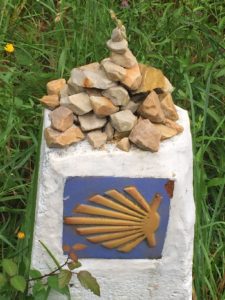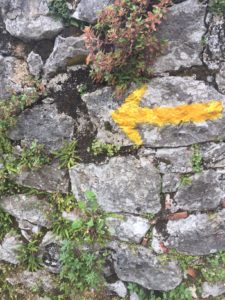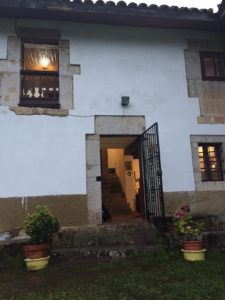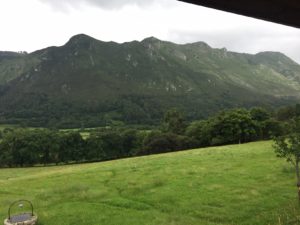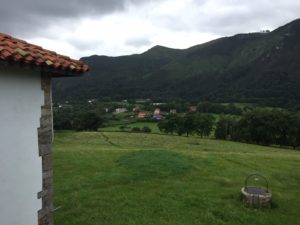bits and pieces
she made us
dinner of nothing
we added
little bits of nothing
sat together talking
through our daily bread
of nothing
really
such a feast
Instead of getting to Villahormes, I stopped in Celorio. An older man in Poo had recommended Celorio, and he was right: for 15 euros, I had – a private room. The luxury of opening up, spreading out. I hung my washed laundry on hangers that now felt foreign, strange in my hands. I laid out all my stuff on the bed and aired out my pack. The things that mattered included my sleeping bag, water bottles, light trail foods, socks, towel, passport, wallet, and guidebook. And I cast a dim eye on the guidebook. The rest – clothes, toiletries, metal bowl and spoon, even my duffle-turned-pack-cover – was superfluous, but added a degree of ease and comfort, each earning its keep in situations where the albergue kitchens were ransacked bare, even of dented cookware and half-melted spatulas, or in the infrequent deluges of rain. But the most precious item, the one I would carry in my arms like a baby if I had to, was my notebook.
Everybody had something, it seemed. A woman carried a ukelele, a man a guitar. A camera was precious to this person, a sketchpad and pencils to another, like Svend. Miguel wore tiny bells that chimed. One man carried an enormous, elaborately carved didgeridoo. They all added weight, or awkwardness through gates and city crowds, or issues in the rain. And they all seemed to be about creating, expressing ourselves and relating to each other and to the Camino itself. We wore our hearts on our sleeves for all to see, carrying them on our backs like millstones of freedom, each with our talisman.
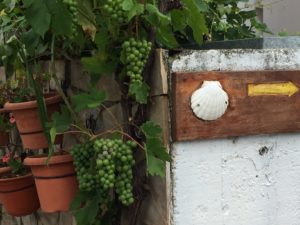 I was writing faithfully, every day, little observations, snips of poetry, descriptions of fascinating characters, obsessively counting kilometers, ignoring kilometers in favor of deeper meaning, describing my epiphanies, my food and my blisters. My notebook would be my memory, I knew, but something more: it was my roadside shrine, my daily chapel. It was my zendo, the place I sat still; it was my mosque, the place I bent low in prayer and spiritual communion.
I was writing faithfully, every day, little observations, snips of poetry, descriptions of fascinating characters, obsessively counting kilometers, ignoring kilometers in favor of deeper meaning, describing my epiphanies, my food and my blisters. My notebook would be my memory, I knew, but something more: it was my roadside shrine, my daily chapel. It was my zendo, the place I sat still; it was my mosque, the place I bent low in prayer and spiritual communion.
Most days after writing, I would rewrap my notebook in the plastic bag from my socks purchase, followed by the mandatory antibacterial plastic bag from the albergue that was sure every peregrino had bedbugs. I would tuck it back into my backpack, and then, every day, I left everything behind: to take a shower, to make food in the kitchen, to see the city, to head for the beach. We all did. We grabbed a handful of money and our IDs and went to live in the moment, with nothing but our selves.
* * * * * * * * * * * * * * * * *
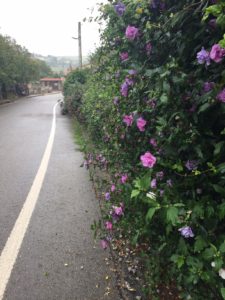 I had been thinking I should buy a swimsuit, maybe as a souvenir after Santiago. However, walking through the town of Llanes earlier, I passed a woman in a sidewalk kiosk selling handmade cotton bikinis, each one unique, because they were made from leftover fabric samples and scraps. Clever and resourceful, she was excited to take the risk, set up shop, invest in herself and her idea. One suit caught my eye, flowers and polka dots, and I bought it without even trying it on. Because I knew it would be perfect – and it was.
I had been thinking I should buy a swimsuit, maybe as a souvenir after Santiago. However, walking through the town of Llanes earlier, I passed a woman in a sidewalk kiosk selling handmade cotton bikinis, each one unique, because they were made from leftover fabric samples and scraps. Clever and resourceful, she was excited to take the risk, set up shop, invest in herself and her idea. One suit caught my eye, flowers and polka dots, and I bought it without even trying it on. Because I knew it would be perfect – and it was.
The rest of the day, I carried her creativity and colors with me as I hiked toward Celorio. My mind turned over images while I found myself alternately singing pieces of old rock ballads and my grandma’s church songs, humming and la-la-ing in the places where I had forgotten the words. Marching along to my play list, I would sing until – someone fired a cannon. Abruptly, I halted, listening carefully, trying to locate the source. But in the hills, the sound echoed randomly. I started again, hiking the perfectly normal trail under blue skies, eventually humming and then singing again. Into the great wide open, under the skies so blue, into the great wide open — BOOM! BABOOM! A rebel without a clue. This was not the sound of hunters, or firecrackers; this was definitely cannon fire.
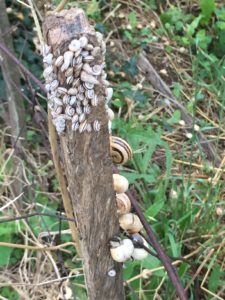 I passed a terribly rundown shack, an improvisation of found siding and patchwork roof coverings sunk low into a hollow between hills. A dog hurled itself against its chain, barking maniacally from the shadow of an old van parked out front. Eyeing the strength of the chain, I passed by quickly. BABOOM! The dog ceased his tirade, looked around, then started up again, sending me on my way. No cannons at the shack, I noted ridiculously.
I passed a terribly rundown shack, an improvisation of found siding and patchwork roof coverings sunk low into a hollow between hills. A dog hurled itself against its chain, barking maniacally from the shadow of an old van parked out front. Eyeing the strength of the chain, I passed by quickly. BABOOM! The dog ceased his tirade, looked around, then started up again, sending me on my way. No cannons at the shack, I noted ridiculously.
Learning something new is a mystery, a treasure hunt, a game of hide-and-seek. Just like when my grandma taught me to make quilts, you matched up scraps, holding small colorful bits together, stitching one short side so that now you made a connection. Joining your connected pieces, you could start to form a larger, more useful whole.
Now, I wore my new bikini to the Chicken Fiesta, by the beach, in Celorio. With festive scarf skirt wrap, of course. Mystery solved: cannons are a favorite way to celebrate fiestas in the small coastal villages of northern Spain. I saw the last bit of a traditional dance, lots of hop-stepping, drumming, and bagpiping, the ghost of a Celtic past peeking through, but now with castanets. The dancers’ rhythmic turning in traditional peasant costumes was hypnotic, as they stepped forward and back, encircling each other above the turning of the waves.
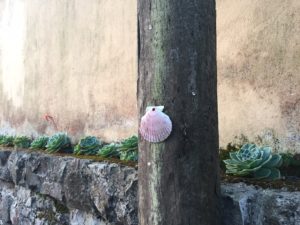 The Chicken Fiesta was a weekend family holiday, a midsummer excuse to eat – chicken – and play together. That was it; I asked several people. Just chicken…and being together.
The Chicken Fiesta was a weekend family holiday, a midsummer excuse to eat – chicken – and play together. That was it; I asked several people. Just chicken…and being together.
So today’s great concerns for me became evening out my peregrina farmer tan, and finding some chicken. I dozed on the sand under a soft sky, played in the waves with everyone else, got a glass of wine – and chicken – from the beachside bar, and dozed again on the sand. Because today was Chicken Fiesta. And today was Sunday.
I was starting to put it together. This whole day of rest/sabbath thing was brilliant. Just let it go. Leave your stuff and your backpack, your worries and your cares, and just live. Eat, drink, and be merry, for once in your life.
You can’t control everything. Really, anything. Who knew. BOOM.
* * * * * * * * * * * * * * * * *
I was the first to arrive at the old rectory on the hill. Facing a wall of lush, green mountains, it stood quietly meditating in the mist, serene.
I knocked on the door, surprising the man inside, who came to the door to send me away and then realized with a start that a peregrina had arrived, sola. Embarrassed at his small mistake, he blushed red and checked me in, writing my name and passport number and birthdate and age (“cincuenta y uno?” “si, si”) and country (“Americana – bienvenidos!”) into the boxes in the grid across his page. Demographics checked, X marks the spot, he came to the final question: reason for walking the Camino?
Espirituál. He smiled approvingly.
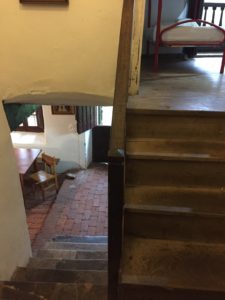 Giving me a tour, I felt happily at home. The main room was snug and warm, even with its brick floor. Upstairs, multiple small rooms held many bunks, with long, door-length windows between, shutters pulled open allowing the massive presence of the mountains to quietly enter. I chose a bed immediately up the narrow twisting stairs, and proceeded down to the herb-filled boot room to drop off my boots, and through the side door to the outdoor showers, each enclosed, in the walled garden where I could wash my clothes and hang them under the portico.
Giving me a tour, I felt happily at home. The main room was snug and warm, even with its brick floor. Upstairs, multiple small rooms held many bunks, with long, door-length windows between, shutters pulled open allowing the massive presence of the mountains to quietly enter. I chose a bed immediately up the narrow twisting stairs, and proceeded down to the herb-filled boot room to drop off my boots, and through the side door to the outdoor showers, each enclosed, in the walled garden where I could wash my clothes and hang them under the portico.
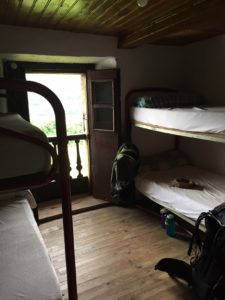 Clean, refreshed body and soul by showers of water and of words into my notebook, I sat at the large table in the main room, adding shells to Saint Thomas. Everywhere I had brought my walking stick, he became an instant conversation starter, a Camino talisman in his own right, as he was covered with the generosity of peregrinos. Everything about him was a gift, from his colorful orange cord, then a cotton string the color of peaches, onto which I had hooked one of the tauburu earrings from Begoña, and now aqua-hued plastic cord to tie the shells of las playas onto him. Even the tree I snapped him from had given him to me. Saint Thomas was my daily reminder of the adage we were all learning to live by: the Camino provides.
Clean, refreshed body and soul by showers of water and of words into my notebook, I sat at the large table in the main room, adding shells to Saint Thomas. Everywhere I had brought my walking stick, he became an instant conversation starter, a Camino talisman in his own right, as he was covered with the generosity of peregrinos. Everything about him was a gift, from his colorful orange cord, then a cotton string the color of peaches, onto which I had hooked one of the tauburu earrings from Begoña, and now aqua-hued plastic cord to tie the shells of las playas onto him. Even the tree I snapped him from had given him to me. Saint Thomas was my daily reminder of the adage we were all learning to live by: the Camino provides.
As I tucked him away under my bunk, who should arrive but Saulomon and Karolin. “Barbara! Come on, come on – I am going to make a feast! Come, join us in the kitchen,” Karolin grinned, arms wide for hugs. So, as Karolin cooked pasta, adding some tomato, a bit of green pepper, a small onion, a little garlic, Saulomon and I made a salad. I contributed the last of my sunflower seeds, and a small tangerine. And all the while, we talked of nothing, and everything.
